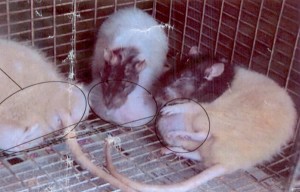I recently listened to one of those infomercials that promised to solve every health problem under the sun. I ended up paying quite a bit to buy their reports because they mentioned one “little” thing that has been causing me quite a lot of problems. They mentioned calcification. When I got the reports, I looked through them eagerly to find the answer to what causes calcification to occur where it isn’t supposed to be. The answer was at the back of one of the smaller books I received. Continue reading
cancerTag Archives
“My Aspartame Experiment” by Victoria Inness-Brown
There’s a rather interesting study of aspartame done by amateur scientist, Victoria Inness-Brown. In a 2½ year multigenerational study of rats, a whopping 67% of the female rats developed tumors the size of golf balls or larger! That’s huge on a rat. Necropsies done by a county veterinarian on several of those animals revealed that these tumors were cancerous. Birth defects were seen in subsequent generations. Continue reading
Low-carbohydrate diets for cancer
I have been looking into research on low-carbohydrate diets and cancer. They are just beginning to do studies for the purpose of looking into this issue. I suspect that this is because it has been so literally politically incorrect to look at low-carb diets that it just wasn’t done for a long time. After all, the government and other major medical agencies have been promoting low-fat/high-carb diets for some time now, and these are what have been tested most. Anyway, test tube and animal studies of low-carb diets are showing good results. A few human studies are underway, but they are only allowed to enroll cancer patients who have exhausted other options.
Compliance is a big problem with low-carb diets. People love their carbs. They’re so addictive. One cancer study looking at low-carb diets is having problems with that issue. Participants just don’t want to give up cakes, cookies, chocolate, soda, or whatever. And these are people who have had PET scans to determine that their tumors are consuming glucose preferentially. You’d think they’d be motivated.
References:
Diet and Cancer: Ongoing Research. Nutrition and Metabolism Society.
Low Carb, High Protein Diet May Help Fight Cancer By David Liu, Ph.D. and editing by Elizabeth Hutchinson.
Carbohydrate restriction in patients with advanced cancer: a protocol to assess safety and feasibility with an accompanying hypothesis. Eugene J. Fine, MD, MS, C. J. Segal-Isaacson, EdD, Richard Feinman, PhD, Joseph Sparano, MD. COMMUNITY ONCOLOGY. January 2008.
Carbohydrate restriction may slow prostate tumor growth. Health News Track, 2009.
A Holistic Approach to Cancer. Weston Price Foundation.
Choosing dietary fats
Dietary fats are not all the same. Some can be harmful while others are quite healthy. Some contribute to inflammation, some ease it. Omega-3 in particular is noted for its anti-inflammatory properties. I definitely would NOT recommend vegetable oil such as from soy or corn. It contains too much omega-6 fat, which causes inflammation. That type of fat will also suppress your immune system and contribute to cancer. I don’t tend to eat much of those at all, unless I’m eating in a restaurant that prepares the food with vegetable oils. I don’t use them at home. Animal fat from pasture-raised meat and dairy, olive oil, and coconut oil don’t contain much omega-6, so they should all be fine. In fact, these kinds of oils can help the immune system and protect against cancer. The type of fats you choose will make a difference in weight as well. Pig farmers tried using coconut oil to fatten their pigs. It didn’t work. The pigs stayed lean. Then they switched to vegetable oil, and the pigs got fat.
Critique of studies on which our “healthy diet” advice is based
I just read Dr. Mercola’s critique of the principal studies on which our “healthy diet” advice is based, The Cholesterol Myths that May be Harming Your Health. It would seem that there’s a lot of misleading information being promulgated.
To start with, Dr. Ancel Keys cherry-picked his cases for the Seven Countries Study back in 1953 when he told us that higher fat intake correlated to higher rates of coronary heart disease. Had he used data from all 22 countries that had data available, no correlation between dietary fats and coronary heart disease would have been found.
Analysis of the Framingham Study showed that lower blood cholesterol levels were associated with a lower cardiac risk. What they did not tell us was that the same study determined that the more cholesterol and saturated fat people ate, the lower their blood cholesterol levels. And yet we were told to lower our cholesterol and saturated fat intakes.
And finally, while the “MrFit” Study did show a marginal decrease in coronary heart disease for those who ate a low-saturated fat and low-cholesterol diet, there was an increased all-cause mortality rate for those who followed such a diet with an increase in deaths from cancer, brain hemorrhage, suicide, and violent death.
